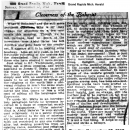Main menu
- ‘Abdu’l-Bahá’s Journey
- World Peace
- Stopping Racism in America
- Empowerment of Women
- More Principles...
- Prayer for America
Cleverness of the Bahá’í
What is Bahá’ísm? and the still more pertinent question. Why is it? may engage our attention for few moments this morning. Though we do not, perhaps, hear so much of the movement now ‘Abdu’l-Bahá has left America and gone back to the continent, it appears still to be making some headway. Like all new cults, it has its inevitable following of the curious and the dissatisfied. But there are also those who have studied it more deeply.
Just what is it? Technically, something not a little complex, and which appealed to James T. Bixby as meriting many pages in the June issue of the North American Review; more simply and with, no embroidery, it appears to be an attempt to merge all the religions of the earth into a universal religion in much the same manner as educators a few years ago conceived the idea (more or less a wild one) of sifting all the languages into Esperanto.
To quote Mr. Bixby in an introductory paragraph before he becomes involved in a mass of somewhat mystifying explanations: “This mission” (that is, ‘Abdu’l-Bahá’s) “is very significant religiously. It is a public display of the addition to the list of missionary religions of a new and enterprising faith not restricted to any one nationality, but seeking proselytes from all existing races, countries and religions. Its aspirations are world-wide and it sets forth remarkable claims to be better adapted to become a universal religion and to be a higher and fuller revelation of spiritual truth than any of its historic predecessors, such as Judaism, Mohamedanism, or Christianity.”
If success equals the pretensions of this new order it will indeed receive much distinction. Sometimes, however, a spirit of judicious doubting is preferable to the blind rush which carries so many men, thinking men, too, off their feet. Better, like Thomas of old, to doubt and then be convinced, than to embrace and then later have to retract. The stand taken by the masses of the people, if it is not antagonistic, is probably skeptical. In these modern tumultuous times in which we live it is best to proceed with a good deal of caution.
Now as to the second question, Why is the Bahá’í movement? That is just it; it is an immediate outcome of the above mentioned tumultuous modern times. Religion and psychology, through some peculiar state of affairs in the human mentality, have taken up arms against one another. In many stages of the world’s growth science and romance have come to blows. The church, symbolizing the entire religious impulse among men, has been attacked. Spiritual truths have been scoffed at. And though today we still have romance, religious impulse, faith, spiritual insight, just as always, still the warfare has to be carried on, by way of showing, perhaps, that human nature remains fixed amid all the vicissitudes of decline and development.
Thus Bahá’ísm leaps into the breach. Everything is at sixes and at sevens in the world. There are many who will eagerly step forward and embrace something new and apparently hardy. It is not a bad thing. It helps to equalize and strike a balance.



.png)





